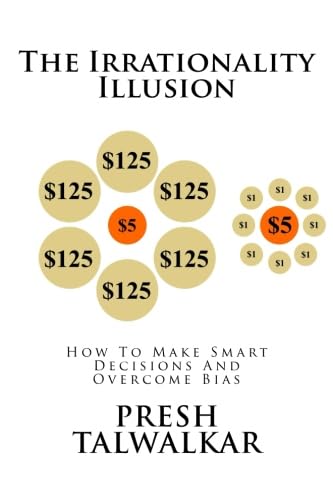


Full description not available
B**D
Really Insightful
Very informative and insightful. Gives a good foundation and starting point to expand & explore Behavioral Economics. I highly recommend reading and taking notes. It has made more mindful of myself especially the Sunk Cost Fallacy.
A**R
Very Enjoyable Book!
Great book! Thoroughly enjoyed reading it. The little extra tidbits of math made it that much more enjoyable. The chapters were short, concise, and focused on one particular topic. I found that I could always pick up the book while riding on the subway, waiting for my code to finish compiling, or other little pockets of time that I had throughout the day. Plus, the real life examples really made you think and consider about how biases affect your life. I highly recommend it!
K**T
Good read, decision and critical thinking topics
I like the concepts and the way the information is presented in this book, it allows for a multitude of recipients to receive the information clearly and come to the same conclusion. I've noticed that when a book covers a complicated topic, sometimes different people will receive and perceive the information differently, leading to a variety of interpretations. I think being able to effectively, accurately, and consistently deliver information is what makes this book worth reading. The topics are also applicable to life in general, outside of financial and business aspects, but I did find parts of the book to be a bit repetitive, but maybe thats a tactic which allows for the reader to get additional clarification.
P**E
Five Stars
GOOD
T**N
Speaking of Bias...
The irony of the book is that the author approaches the problem of bias, with severe bias! It is not a novel work, but the author essentially, jumps on the Daniel Khanamen, anti-empirical bandwagon, which anti-intellectual America loves to swallow. It fuel for reason, rationality, anglophilic grandiosity, and the proverbial spirit of, as physicst Sean Carroll said, "I can sit on the couch, sipping scotch and understand how the universe works". The anti-intuition criticism fall short when one recognizes the historical importance of free invention (as Einstein called it), in inventing the right 'perspective' for either solving problems or learning something new about the world. Instead, in the authors examples, while the reasoning is impressive, you have all the 'perspective' you need, right in front of you! So his problems are merely exercises in short-term memory. Of course, in large complex systems one doesn't know where or when to look to find perspective, but expert intuition helps go through the data and create new associations (new models) which give us the right 'perspective'. Consider Pascals triangle which is a free standing invention that (via analysis), allowed him to discover a new pattern. A person may take years to develop high intuition in a field, but it allows them to creatively invent models, which give us the right perspective for analysis - and perspective that is highly unlikely that the layman will run in to.A second criticism of this book, and the anti-intuition camp in general, is that demonstrating a few instances where intuition is counter-productive, does not prove that intuition is not, usually, extremely useful. Gerd Gigerenzer has produced some outstanding work and provided examples on how intuition allows us to gain insight. I highly recommend his book "Simple heuristics that make us smart".......https://www.amazon.com/Simple-Heuristics-That-Make-Smart/dp/0195143817/ref=sr_1_1?ie=UTF8&qid=1544100287&sr=8-1&keywords=Simple+heuristics+that+make+us+smart
C**I
good purchase
fun read
A**R
Five Stars
good product, quick delivery,excellent
T**S
Elémentaire
Je m'attendais à quelque chose d'un peu plus élaboré. Ce livre est ponctué de conseils élémentaires pour éviter les biais cognitifs présentés. Peut résulter utile aux lecteurs souffrant d'innumérisme. Présente peu d'intérrêt pour les autres.
O**Y
Disappointing
Disappointing, there's more and better material available for free.
Trustpilot
2 months ago
1 week ago